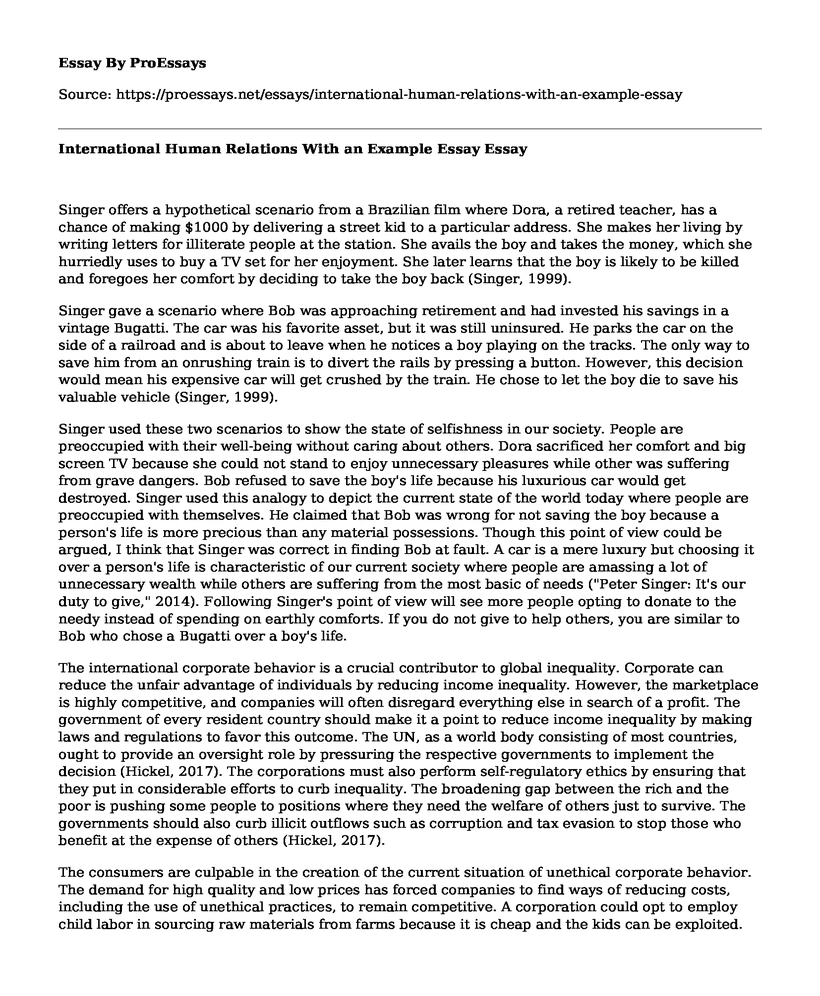Singer offers a hypothetical scenario from a Brazilian film where Dora, a retired teacher, has a chance of making $1000 by delivering a street kid to a particular address. She makes her living by writing letters for illiterate people at the station. She avails the boy and takes the money, which she hurriedly uses to buy a TV set for her enjoyment. She later learns that the boy is likely to be killed and foregoes her comfort by deciding to take the boy back (Singer, 1999).
Singer gave a scenario where Bob was approaching retirement and had invested his savings in a vintage Bugatti. The car was his favorite asset, but it was still uninsured. He parks the car on the side of a railroad and is about to leave when he notices a boy playing on the tracks. The only way to save him from an onrushing train is to divert the rails by pressing a button. However, this decision would mean his expensive car will get crushed by the train. He chose to let the boy die to save his valuable vehicle (Singer, 1999).
Singer used these two scenarios to show the state of selfishness in our society. People are preoccupied with their well-being without caring about others. Dora sacrificed her comfort and big screen TV because she could not stand to enjoy unnecessary pleasures while other was suffering from grave dangers. Bob refused to save the boy's life because his luxurious car would get destroyed. Singer used this analogy to depict the current state of the world today where people are preoccupied with themselves. He claimed that Bob was wrong for not saving the boy because a person's life is more precious than any material possessions. Though this point of view could be argued, I think that Singer was correct in finding Bob at fault. A car is a mere luxury but choosing it over a person's life is characteristic of our current society where people are amassing a lot of unnecessary wealth while others are suffering from the most basic of needs ("Peter Singer: It's our duty to give," 2014). Following Singer's point of view will see more people opting to donate to the needy instead of spending on earthly comforts. If you do not give to help others, you are similar to Bob who chose a Bugatti over a boy's life.
The international corporate behavior is a crucial contributor to global inequality. Corporate can reduce the unfair advantage of individuals by reducing income inequality. However, the marketplace is highly competitive, and companies will often disregard everything else in search of a profit. The government of every resident country should make it a point to reduce income inequality by making laws and regulations to favor this outcome. The UN, as a world body consisting of most countries, ought to provide an oversight role by pressuring the respective governments to implement the decision (Hickel, 2017). The corporations must also perform self-regulatory ethics by ensuring that they put in considerable efforts to curb inequality. The broadening gap between the rich and the poor is pushing some people to positions where they need the welfare of others just to survive. The governments should also curb illicit outflows such as corruption and tax evasion to stop those who benefit at the expense of others (Hickel, 2017).
The consumers are culpable in the creation of the current situation of unethical corporate behavior. The demand for high quality and low prices has forced companies to find ways of reducing costs, including the use of unethical practices, to remain competitive. A corporation could opt to employ child labor in sourcing raw materials from farms because it is cheap and the kids can be exploited. The consumer behavior has thus contributed significantly to the unfair practices of corporates. Our responsibility is to boycott their products and services if they behave in an unjust or oppressive manner.
References
Hickel, J. (2017). How to stop the global inequality machine. The Guardian. Retrieved 10 March 2018, from https://www.theguardian.com/global-development-professionals-network/2017/may/18/how-to-stop-the-global-inequality-machine
Peter Singer: It's our duty to give. (2014). Bbc.co.uk. Retrieved 10 March 2018, from http://www.bbc.co.uk/ethics/charity/duty_1.shtml
Singer, P. (1999). The Singer Solution To World Poverty. Nytimes.com. Retrieved 10 March 2018, from http://www.nytimes.com/1999/09/05/magazine/the-singer-solution-to-world-poverty.html
Cite this page
International Human Relations With an Example Essay. (2022, Mar 29). Retrieved from https://proessays.net/essays/international-human-relations-with-an-example-essay
If you are the original author of this essay and no longer wish to have it published on the ProEssays website, please click below to request its removal:
- Legal Implications: Unpaid Internship for International Students Essay
- Economic Class Status Effect to Success Essay Example
- Annotated Bibliography on the Impact of Poverty on Educational Outcomes
- Essay on Drunk Woman's Daydreams: Maria's Inner Struggle With Society's Expectations
- Essay Example on Terrorism: Destroying Lives and Causing Injury for Change
- Essay Sample on Young African American Women: Misogyny and Slavery
- Essay Example on Police Brutality: A Call for Reforms in the US







